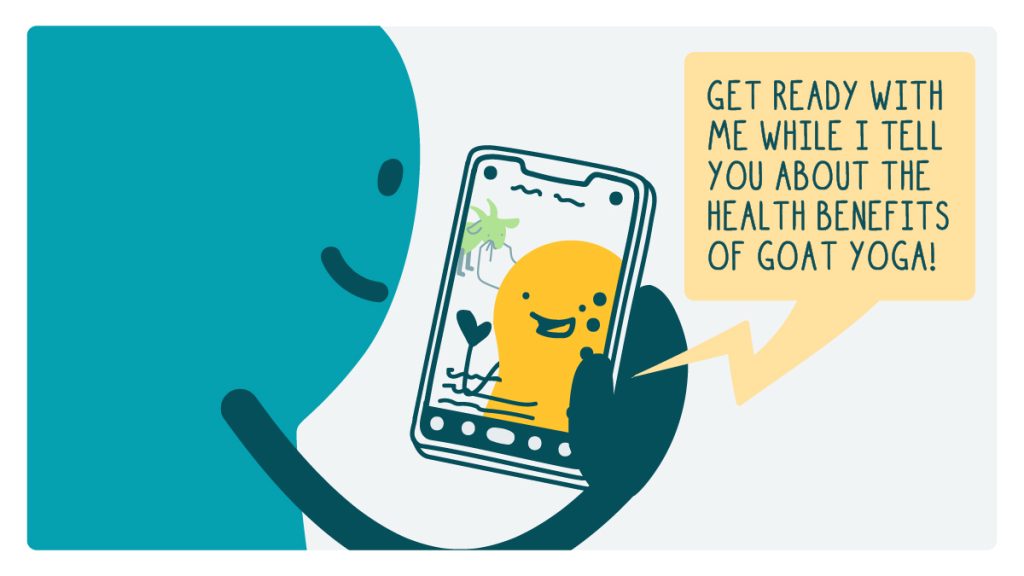
As health communicators, it’s important we reach our audiences where they’re at. And even though we’re aware of the potential pitfalls of social media, it’s become one of the main channels we have for distributing health information. In the social media space, working with influencers has become an important tactic for reaching audiences with information — and one that’s worth exploring for health communicators.
But let’s back up for a second: what is an influencer? In the broadest terms, an influencer is someone who inspires or guides the actions of others. Usually, we think of influencers in terms of marketing — a person who promotes a product, often on social media. Although the concept of social media influencers is relatively new, enlisting well-known personalities to promote brands is an age-old marketing technique — think celebrity endorsements. Traditionally, a brand ambassador may have been an expert in their field, a big-name celebrity, or someone in a position of power.
But in the age of social media, where anyone can broadcast their lives globally, we’re seeing a new kind of influencers who look a lot like you and me — ok, maybe a little more glam. Thousands of “regular people” influencers have amassed followers and created a thriving economy promoting brands and products. But influencers end up promoting more than just goods — they’re promoting their lifestyle choices too, often making recommendations on parenting, diet, exercise, or even important health decisions (like whether to get a COVID-19 vaccine).
You may be wondering: do people really take advice from influencers? According to the Ad Council’s Trusted Messengers Study, the answer is yes. Trusted messengers — or people we trust to receive information from — may look different for every person. Some common examples are family and friends, doctors and scientists, and academic and religious leaders — and for many of us, especially younger generations, influencers.
That’s why influencer engagement is an important tactic to help us promote health behavior change. But, as in all things health comm, it’s important to take a thoughtful approach to make sure we create effective communications (and avoid unintentionally causing harm).
Consider these tips for identifying and working with an influencer:
- Know your audience. This is as basic rule for any kind of health communication, but it’s especially important as you’re thinking about influencers. To find the right influencer to work with, you have to know your audience and who they trust.
- Find the right influencer. You can ask people in your priority audience for recommendations, or you can do your own online search using relevant key words.
- Vet your influencer. Once you identified your top choice, it’s time to do a little digging. When you look up the influencer’s name, what picture emerges? Are there any red flags? Consider the tone, professionalism, quality, and accuracy of their content. Be especially mindful of content promoting misinformation or disinformation (for a refresher on addressing health misinformation, check out this playbook!). Once you’ve done your research, contact the influencer to talk about the potential opportunity.
- Align on messaging. During that first conversation, clearly state the main message(s) you want the influencer to convey to the audience. Ask questions to make sure you’re aligned on the “mission”: For example, if you’re trying to encourage people to get their yearly flu shot, you’ll want to make sure the influencer feels comfortable promoting this message.
- Ask for input. Although you’ll want to come in with a clear idea of your goals, it’s important to consider the influencer’s ideas too — after all, they know what resonates with their audience.
- Set clear rules and expectations. Just like with any business relationship, it’s a good idea to document your collaboration with an influencer in a contract. That doesn’t need to be complex — just a simple document that outlines the services they’re providing, timeline, and payment (most influencers will expect to get paid for promoting your messages, so make sure that’s in the budget).
The bottom line: Working with influencers to promote health behavior change can be an important tool in your health comm toolkit.
Copy/paste to share on social (and tag us!): Curious about working with social media influencers to promote health content? CommunicateHealth has tips for doing it thoughtfully: https://communicatehealth.com/wehearthealthliteracy/the-age-of-influencers #HealthCommunication #HealthLiteracy #HealthComm
Browse recent posts